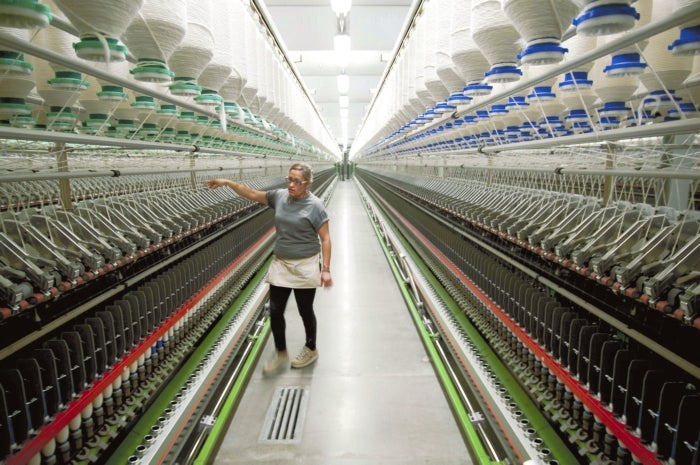Josh Bergeron: As economy changes, Rowan can’t afford to fall behind country
Published 12:00 am Sunday, March 1, 2020

- Gildan employee Patricia Garcia tends to one of several spinning frames that she is responsible for monitoring. In 2012, Gildan announced its Rowan plant, and in 2013, it announced that it was building a second facility here. JON C. LAKEY / SALISBURY POST file photo
That industry they are thinking of is gone.
Those were the words of Robert Van Geons, former Rowan County economic development director, five years ago as things were looking up for the textile industry. Gildan Yarns planned to invest $250 million and create a total of 500 jobs between three plants — two in Rowan and one in Davie. And the company has apparently exceeded that number, with the Rowan EDC’s latest estimate saying the company employs about 700 people in Rowan County. It’s one of the top five employers in the county.
In a 2014 story, there was talk about “the pendulum swinging back.” Recovering from the loss of textile and other manufacturing jobs in the early 2000s as companies looked to other countries required tough, diligent work, and it was a welcome sight for some of the industries that left to be reinvesting in the communities they left behind. Though, it was understood the textile pendulum certainly would never reach the peak of the Pillowtex and Cannon Mills days, where many thousands made their living by graduating high school and going to work in a mill — whether it was in Kannapolis or elsewhere.
Jeanie Moore, who was vice president of Advancement and Continuing Education in 2014, echoed Van Geons’ comments in saying that manufacturing is not dead, but it’s different.
And it’s certainly even more different now, in 2020, than it was in 2014. More so than ever before, workers in some trades have to worry about whether their jobs could be automated away, requiring employees to retrain in related or new fields even though the sector where they are working might be doing well.
Workers then and today need more skills than their predecessors — quick reading comprehension, math, problem solving and a basic-to-advanced level of computer literacy among other things.
“No longer can you drop out of school in the 10th grade and be hired,” Moore said in 2014.
Now, people can’t graduate from high school with just a diploma and expect to land a good-paying job. Even though the unemployment rate is low and employers are more willing than ever to train motivated applicants, new high school graduates need certifications and workforce credentials before they can get to work on the shop floor.
With the news last week that Parkdale Mills plans to close its plant in Landis on April 24, it’s worth wondering just what the future of business will look like in Salisbury and Rowan County.
People in Landis are likely wondering something similar after one of the town’s largest employers and water users is planning to shut its doors. It is certainly a large taxpayer, too.
The plant’s closure will result in 94 people losing their jobs.
Some might be able to secure jobs at other Parkdale Mills plants or with other textile mills, but it’s unlikely that’s the case for all employees. Though, if they’re willing and able to work, manufacturing employers in the area should rush to hire any remaining Parkdale Mills employees.
A counter argument to worrying about the future goes something like “there are still unfilled textile and manufacturing jobs in the area and mills that are hiring,” but the reality that technology is changing workplaces across the country isn’t going to reverse course any time soon.
It’s worth wondering how long it will be until logistics companies convert entirely to self-driving vehicles, with people in tractor-trailers there just for monitoring.
How long will it be until Food Lion changes all of its registers to self checkouts? In 10 years, the manufacturing facility being built now by Chewy.com may use only robots to pick and pull products.
It might not be long before opinion columns in the Salisbury Post about the local economy are written by a computer algorithm.
Just as a high school diploma isn’t enough for a worker looking to hit the shop floor, employers could eventually set the standard at a two-year degree for manufacturing jobs.
Hundreds of workers may be supervising and programming thousands of robots manufacturing products instead of doing the manufacturing themselves.
To future proof workers in Rowan County, it’s necessary to embrace ideas like Rowan-Salisbury Schools’ renewal system, which focuses on students being enrolled, enlisted or employed rather than how they do on tests.
And the county must provide adequate equipment and facilities in which its workers can train, even if the cost of doing so at the time seems unattractive.
The cost of falling behind in the economy of the future will be much greater.
Josh Bergeron is editor of the Salisbury Post.

